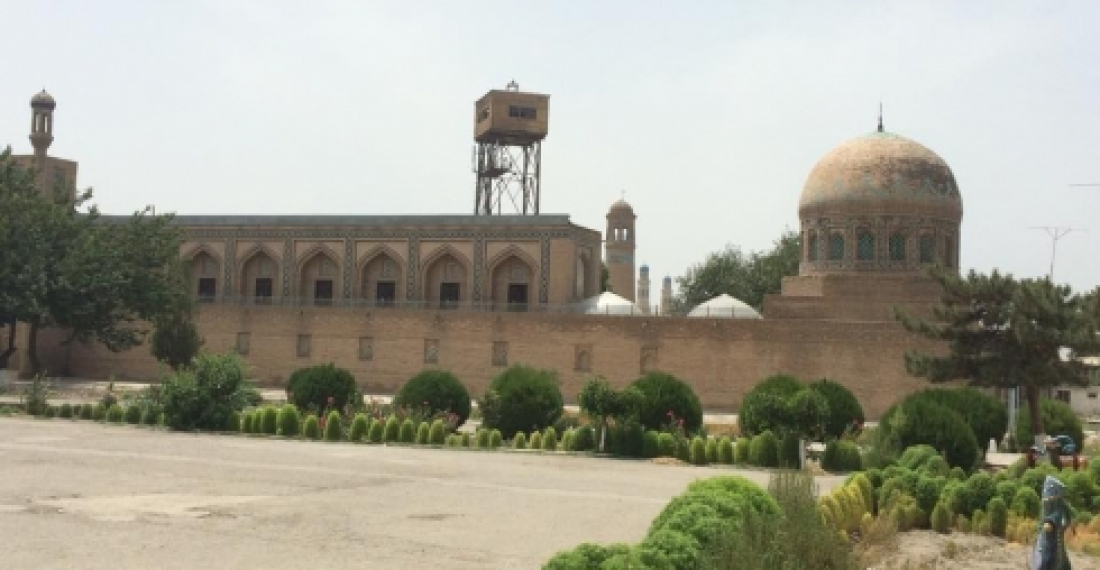Compared to other parts of the former Soviet Union, Central Asia receives little attention in the European Union. A recent decision by the European Council has highlighted the EU’s priorities in the region, but as Gideon Wakefield argues in this op-ed for commonspace.eu, it is in the Fergana Valley where the absence of an EU presence is most felt, and where in many ways it is most needed.
The Fergana valley is the heart of Central Asia, both geographically and in terms of population – in just 0.5% of Central Asia’s land area it houses 20% of Central Asia’s population. The density of population shows: Central Asia is a region where you can easily travel a thousand kilometres without seeing a significant settlement, but in the Fergana valley there is a major city every 70-80km. The productivity this density allows makes it a politically and economically important region but Western countries have often relatively overlooked it in their engagement with the region.
The valley is dominated by Uzbekistan whose territory comprises more than 80% of the area and which contains a majority of the valley’s people. Even in the provinces of Kyrgyzstan and Tajikistan that lie partly in the valley, there are significant Uzbek minorities (as high as 48% in Kyrgyzstan’s Osh City) and Khujand, has always felt historically close to Uzbekistan, often to Dushanbe’s dismay
The EU’s presence in the Uzbek Fergana is small: even though it has a larger population than three of the five central Asian states. The nearest EU offices are in Tashkent and Bishkek – each half a day’s drive away. Surprisingly there is also very little EU private investment in the region. According to the UNDP’s Investment guide to the Fergana Valley, across four major sectors in the valley, of the major foreign investors only two are from the EU while South Korea alone has five. Encouraging private companies based in the Union to consider investing in the Fergana valley should not be an overwhelming task, as the cost of labour is low and the working-age population is increasingly well-educated with around 50,000 students in higher education in the valley. Further, the valley stands to benefit from two significant new infrastructure projects; a new modern train line to Tashkent is being built and the valley will be a benefit from of China’s ‘Silk Road Economic Belt’ initiative, which will give the valley much better connections with the region and the world beyond.
With so many people in such a small area, it is no wonder that the Fergana valley is the most politically active (and volatile) region of Central Asia. It is also one of the most religious and conservative parts of Central Asia with more than 80% of the population being Sunni Muslims, and the birthplace of radical groups such as the Islamic Movement of Uzbekistan. It is no coincidence then that, of the 2,000-4,000 Central Asians who have travelled to Iraq and Syria to join IS perhaps 1,000 are from the Fergana valley.
Anyone who has recently been to the valley will have noticed that many cities (and particularly Fergana City) are undergoing or have recently undergone extensive construction works. These works have mostly been parks, fountains, monuments and renovating of the cities’ central streets, rather than infrastructure development. The funding sources for these projects are unclear. Given the nature of them, however, it seems unlikely that they are Chinese or Turkish foreign investment (the two big emerging investors in the region); they aren’t the kind of infrastructure projects that Beijing usually conducts, and, despite good relations with Turkmenistan and Kyrgyzstan, Ankara’s relationship with Uzbekistan is strained at best. This suggests that the Uzbek state is the primary source of funding for these projects. Perhaps in an attempt to placate the restive region, they are pouring funding into the major cities, yet this alone will not stop radicalisation if the political and economic status quo remains in place.
Engaging with the Fergana valley serves many of the EU’s interests, as laid out in the recent Council conclusions on Central Asia. Assisting in the alleviation of social and political fatigue that drives radicalisation and often leads to the kind of ethnic violence that erupted in southern Kyrgyzstan in 2010, must be a key objective of the EU – both for upholding human rights and for domestic concerns about the spread of extremist ideology. Some EU projects are doing this; the strengthening of communications between the Oliy Majlis and regional assemblies will help, but much more needs to be done. Projects that are in the pipeline, including one that seeks to support grass roots initiatives and connect Uzbek NGOs with local authorities, should be prioritised. The Fergana valley needs these kinds of projects more than anywhere; the stakes are higher there, but so are the returns.
Gideon Wakefield has recently visited the Fergana Valley. He contributed this op-ed to commonspace.eu.
Photo: A former medrasa in the city of Andijian (c) Gideon Wakefield







